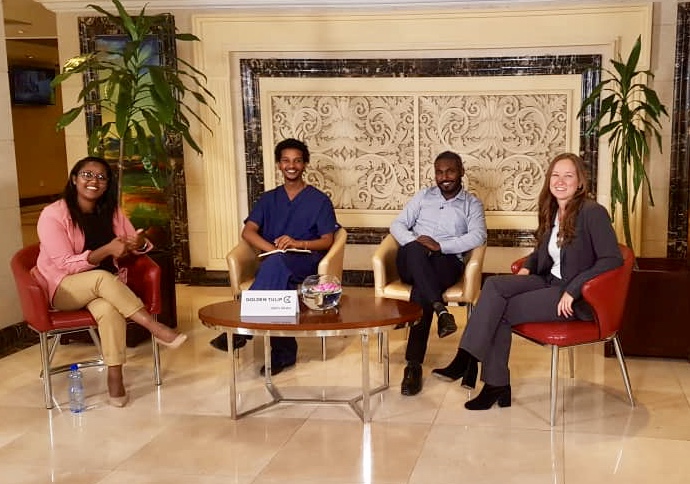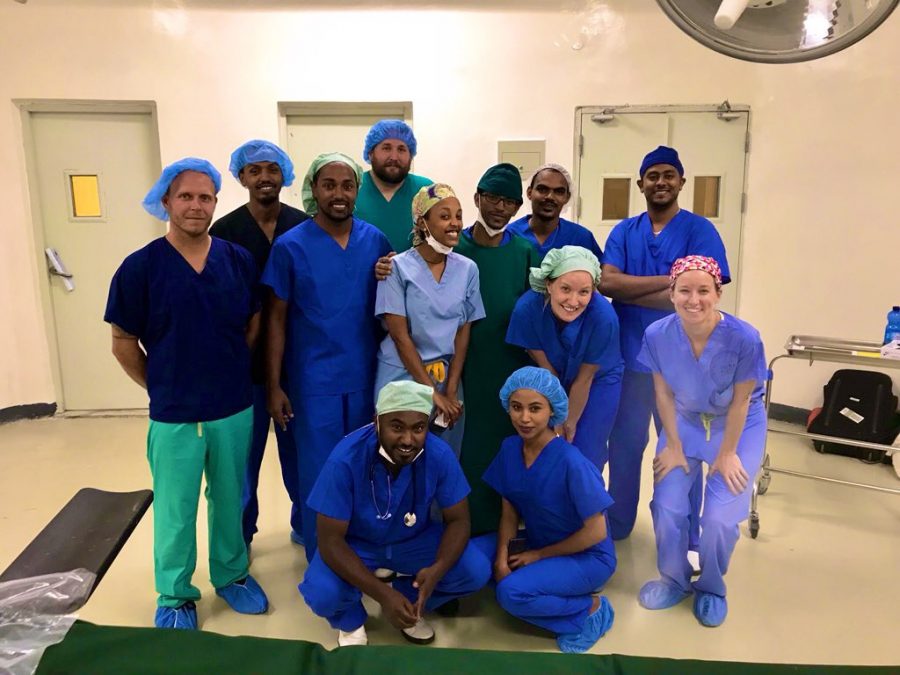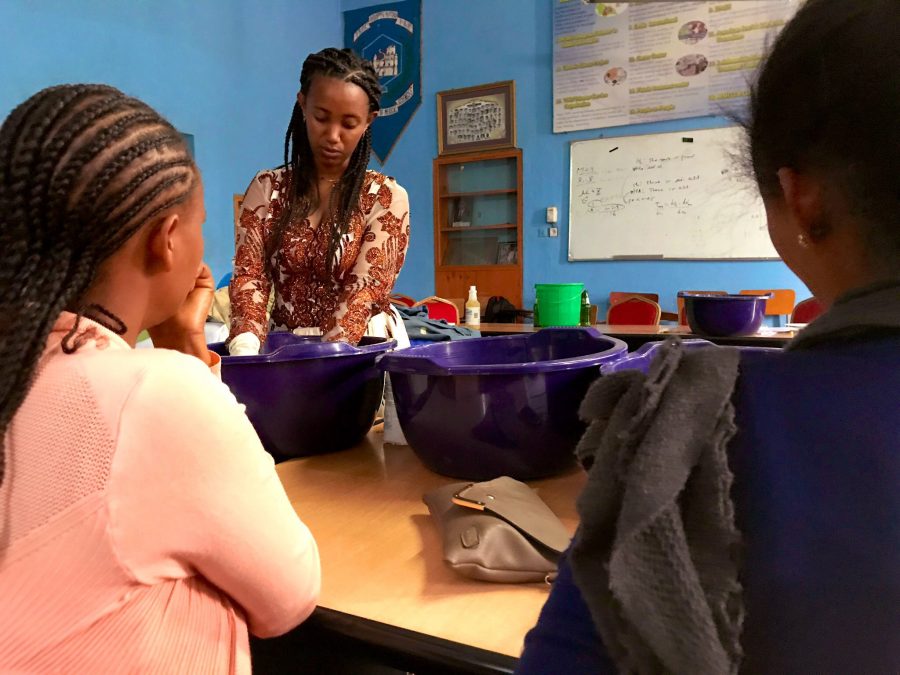
I see real impact—An interview with Nichole Starr, Lifebox Safe Surgery Fellow, 2018-2020
Why did you choose to apply for and work with Lifebox for your residency fellowship?
For my residency research time, I really wanted to work with an academic global surgery group that would give me the opportunity to live and work on the ground. Lifebox’s approach is very much about building local partnerships, and teamwork and communications, which are also core principles of the WHO Surgical Safety Checklist. Lifebox takes this to heart with colleagues around the world. When I first learned about Lifebox, I discovered collaboration with local colleagues was a priority, rather than a “fly in, fly out” experience. This basically convinced me that this was the opportunity I wanted to pursue.

From left to right, Lifebox program manager Senait Bitew, Dr. Abraham Ariaya, Dr. Natnael Gebeyehu and Nichole Starr preparing for an interview on Clean Cut and surgical infection prevention in Ethiopian hospitals, live on the Hakim show, on AfriHealth TV Channel. (August 2019)
Where are you working and what is your day to day like? What should a fellow expect to do?
I live and work in Addis Ababa [capital of Ethiopia]. I have a lovely apartment, and we have an office in Addis where I work very closely with a program manager and program assistant, as well as a number of local medical professionals.
I’m nearly as busy as a clinical resident. We definitely work hard on the ground, and have a lot of cylinders running at all times. Some days I’m in the office doing data analysis, writing, or keeping up with program organization. Other days I work in the hospitals where we are implementing trainings on various aspects of the Clean Cut program, holding refresher workshops on infection prevention, holding hospital team meetings, and innovating solutions to problems we encounter in operating rooms.
I’m working on Clean Cut implementation in three hospitals, and a lot of time is spent with the staff and in the facilities working on different aspects of the Clean Cut program. Every hospital has different needs. The bigger tertiary hospitals may have challenges in teamwork and communications. We find gaps in interpersonal dynamics and in the different systems and policies in place. In a smaller hospital, the challenges may be to fix the autoclave, find a biomedical engineer, or train staff to sterilize instruments properly or count gauze to avoid retained items. Every hospital experience requires something different, requires creativity. So we work with the local staff to identify and close those gaps.
I work closely with the McCaskey fellowship program [Lifebox’s safe surgery fellowship program for Ethiopian nationals], giving feedback on their quality improvement work, participating in monthly sessions, and helping them develop their research results for presentation and publication. I also mentee visiting medical students, for 6 to 12 weeks, on their own projects for Lifebox. Being a mentor on the ground has been a really fun part of this experience.
My work hours are flexible, I have a lot of control over my own schedule. Our programs are built around the schedules of the hospitals. I basically set my own hours, but set them like a surgical resident.
On the social side, there’s lots of live music here in Addis, a big jazz scene. I listen to Ethiopian jazz with friends and go out for Ethiopian food. And I love salsa dancing! There is a huge salsa community here. On my free evenings, I go dancing.
What makes being a Lifebox Safe Surgery Fellow special? What do you enjoy most about it?
For a resident who is really self-motivated and driven and wants to make impactful and career-building change, there is no other fellowship you would want besides this one. You will have really strong academic mentorship, which you need to be successful as a research resident. But there’s also a lot of freedom and flexibility. A year in, I have the support of my surgical and anesthesia mentors, I can always reach out to them for feedback and input on how to manage data, programs and publications. I’m also driving a lot of how the programs are being implemented, taking a directing role in innovation in the programs. I feel like I can act as an implementer in addition to being a mentee. I don’t see a lot of other programs like this. I push myself a lot on what we focus on. It’s a lot of hard work, a huge responsibility, but it’s something I wanted and has allowed me to grow professionally.
What I enjoy most is seeing how all this work is playing out. We see patients with less infections after surgery. And we see the local physicians growing and becoming leaders in their own right. Knowing my impact helps not just my career but the careers of others is really very satisfying.

The second cohort of McCaskey Fellows, along with Jess Hawkins from Stanford Extreme Team and Nichole Starr, pose together shortly after filming short educational videos on surgical infection prevention standards. (May 2019)
How do you expect this experience to enhance your residency and career, as well as other fellows?
I think for every surgical resident, you want these two years for research to be defining your professional development. As a resident I know these are defining years. In this experience, I tend not to focus a lot about publications because they will come. The important thing is if this is the kind of experience one wants to have or not. Here there are intangibles – getting to experience the NGO landscape, meeting and working with the country’s Ministry of Health, working with local clinicians on a daily basis. It’s so multidimensional – I’m learning a lot about international development work, data analysis and management, managing interpersonal relationships in this cross-cultural setting. It’s been a really rich experience becoming a global health professional.
Are fellows able to do original research? What kind of research are you doing?
Yes, Lifebox wants its programs to be data-driven and well-evidenced. We have a number of publications coming out of our work developing, piloting, and scaling Clean Cut’s surgical site infection prevention program. I’m also working on testing and scaling a mobile data entry platform, which we will implement and hopefully publish as well. Lifebox has given me a lot of flexibility to explore my own research interests, such as treatment approaches in gastrointestinal surgery and trauma care system strengthening.
Who are your mentors in Ethiopia and internationally?
My primary mentor is Tom Weiser [Clinical Advisor at Lifebox, and an Associate Professor of Surgery at Stanford University]. He’s an excellent mentor to have because he comes from a surgical perspective and also went through this experience as a surgical resident previously. It’s rare to find a mentor in surgery who will invest so much time in residents’ success; we meet weekly to keep our work on track and he provides me insights and advice. He’s been part of Lifebox since the beginning and is someone who wants your success and success of the program. Another mentor is Dr. Tihitena Negussie – she is a highly respected pediatric surgeon from Ethiopia who advises closely on Clean Cut and day-to-day work, and is a great advocate for women in academic surgery. Professor Miliard Derbew is a pediatric surgeon on Lifebox’s global governance council and advises and oversees all the programs. At UCSF, where global surgery is a priority, my mentors are Hobart Harris and Julie-Ann Sosa, from whom I receive strong support.

Mekdes, a Head Nurse in the Gondar Clean Cut program, carrying out a teach-back session on instrument reprocessing during a Safe Instrument ToT in Gondar. (June 2019)
What do you think surgical and anesthesia residents might find most interesting about the fellowship?
The most interesting aspect is the on-the-ground nature of this experience. There are a lot of opportunities out there today to do global surgery work. Although by no means saying it’s impossible to impact in another way, but I find Lifebox’s method to be most impactful and meaningful to me, by being on the ground and seeing things directly with my own eyes. You have to be willing to put your nose to the grindstone, including really challenging days. For those moments of failure and frustration with your colleagues, you experience it with them, but you also share successes.
I see real impact. At our most remote hospital site, we gave a safe instrument training on surgical instrument reprocessing and sterilization. This was a hospital without a staff surgeon until recently. They had had no training on cleaning instruments. Their head OR nurse recently sent us some videos showing the training being given to the rest of their nurses, showing like what kind of brush is needed to get debris and rust off instruments, demonstrating proper washing and packing techniques. Seeing those videos and seeing the real impact on the safety of surgery there, it was such a cool moment. This is a special experience.
What’s the one takeaway you’d like someone to have who might be thinking to apply?
If you want to do global surgery work that you know is developed and driven by local partners, and you know will continue after you’re gone, growing and sustaining, then this is the type of fellowship to do. It’s not glamorous, there are a lot of challenges where you bang your head against the wall at times, but at the end of the day, I know that this work is impactful and sustainable. I wouldn’t want to be in any other program in my career right now.

